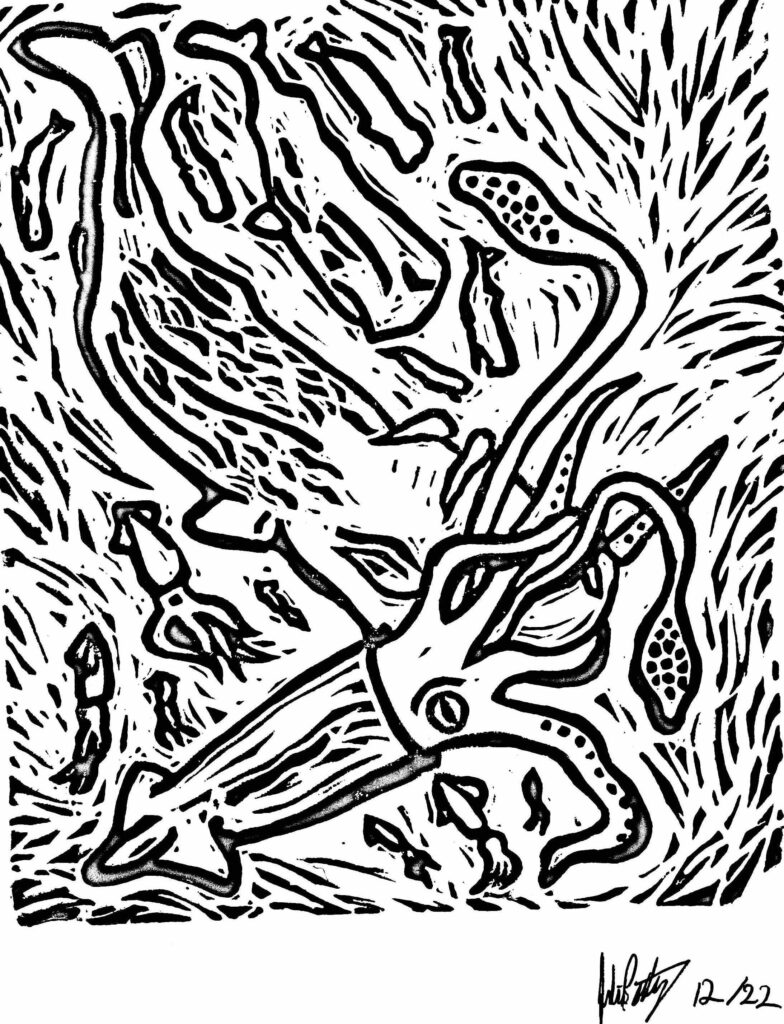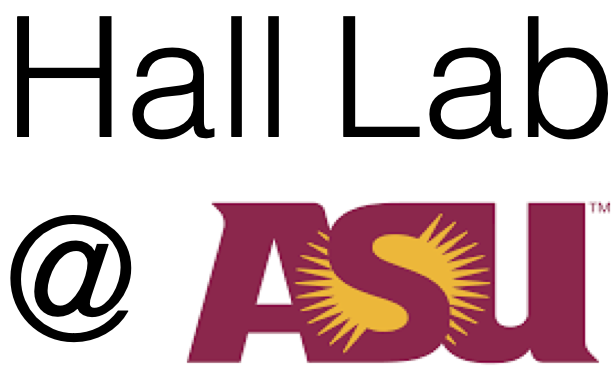“The roots of wrongness often reside in confusion, powerlessness and a need for social connection”
— Dannagal Goldthwaite Young (Wrong: How Media, Politics and Identity Drive Our Appetite for Misinformation, 2023) as quoted by Jennifer Szalai’s article The Problem of Misinformation in an Era Without Trust (Dec 2023, NY Times)
Our team explores ecological patterns and processes in human-dominated ecosystems, and investigates ways to build a brighter, more diverse and inclusive pathway for the next generation of conservation scientists. We conduct basic and use-inspired research through multi-disciplinary collaborations to inform environmental and higher education policy, protect and restore wildlands, and enhance human benefits from nature.
Latest News from the Hall Lab
Congratulations recent and upcoming Hall lab graduates!
A lot has happened in the Hall lab! Alexandreana Cocroft successfully defended her Biology MS thesis, "Neighborhood Ethnicity is Related to Occupancy of Mammals Across a Diverse Metropolitan Area", and she's now working for the US Forest Service as a wildlife...
✿ Updates from the Hall Lab
The days in August and September were a flurry of activity! Here are some updates from the Hall Lab : The Hall lab presented research at the 2022 annual conference of the Ecological Society of America conference in Montreal! Graduate students Aleigh Cocroft and Jeff...
✿ Ph.D. candidate Jeff Haight awarded 2022 Dissertation Completion Fellowship from the School of Life Sciences
Congratulations to Jeff Haight for this award, which will support his last year to complete his dissertation, "Managing for Biodiverse Cities through Understanding of Spatiotemporal Patterns of Wildlife Communities."
✿ Hall named 2022 President’s Professor
Dr. Sharon Jae Hall is named President’s Professor, one of ASU’s most prestigious faculty honors, for her innovation in teaching, scholarly achievements and contributions and the ability to motivate and inspire students to create original works. See video...
✿ Listen! Sharon talks with hosts Jay and Scott about sustainable landscapes on Episode 60 of Sustainability Defined
Former home page quotes
“Just because time moves more slowly than we wish it did doesn’t mean we should not recognize its motion.”– John McWhorter, in his article Why Racial Discussions Should Also Focus on Progress (March 2023, NY Times)
 “I worked on this print entitled “Arcana Major” as my art project last semester to keep hobbies alive while in grad school. I first heard of this apparently esoteric interaction between giant squids and sperm whales at an exhibit in the American Museum of Natural History. The exhibit explains that, while there is evidence of sperm whale predation on giant squid, this interaction has never been directly observed by humans. More than that, the total population of both species is nearly impossible to estimate, and ecologists have to rely on indirect data like beached whales and pieces of squid found in their stomachs. So, with such few definitive answers, even with all our effort and technology, it’s possible there are generations of these giants duking it out in the unexplored ocean depths. This has fueled my scientific curiosity. To be able to discover is to be open to asking, “what if?”. What if our submarines and fish nets just haven’t detected this phenomenon yet? Even further, what if we find some great solutions to our current ecological collapse if we just keep looking? As long as there are people willing to ask, “what if” and willing to keep diving into the deepest most unexplored corners of the world to find their answers, then maybe it’s not so difficult to entertain the slim chance that we will establish global sustainability.” — Jules Petty, artist and Environmental Life Sciences Ph.D. student, 2023
“I worked on this print entitled “Arcana Major” as my art project last semester to keep hobbies alive while in grad school. I first heard of this apparently esoteric interaction between giant squids and sperm whales at an exhibit in the American Museum of Natural History. The exhibit explains that, while there is evidence of sperm whale predation on giant squid, this interaction has never been directly observed by humans. More than that, the total population of both species is nearly impossible to estimate, and ecologists have to rely on indirect data like beached whales and pieces of squid found in their stomachs. So, with such few definitive answers, even with all our effort and technology, it’s possible there are generations of these giants duking it out in the unexplored ocean depths. This has fueled my scientific curiosity. To be able to discover is to be open to asking, “what if?”. What if our submarines and fish nets just haven’t detected this phenomenon yet? Even further, what if we find some great solutions to our current ecological collapse if we just keep looking? As long as there are people willing to ask, “what if” and willing to keep diving into the deepest most unexplored corners of the world to find their answers, then maybe it’s not so difficult to entertain the slim chance that we will establish global sustainability.” — Jules Petty, artist and Environmental Life Sciences Ph.D. student, 2023
“From our finned relatives, we cannot talk about salmon without discussing the health of the rivers and oceans, the different fishing nets used and the best marinade and sauce to cook with. Food opens a window to examine the whole, where we can start with one single seed, such as an acorn, and end up with a thriving 400-year-old oak tree where Pomo gatherers sing acorn-gathering songs and practice cultural controlled burns to help the oak thrive.”— ASU Prof Melissa Nelson, Indigenous scientist and Director of The Cultural Conservancy, from an article in Eating Well magazine (Nov 22).
“I’m sure you will learn a lot about the bureaucracy, but the best advice is to trust your instincts, focus on your role amidst the million things going on around you, and just be your authentic self” — Advice to Sharon from a trusted colleague, regarding her decision to step into a new academic leadership role at the university.
“Is it too much of a leap to think we might someday decode the sperm whale click for ‘mother?’ For ‘pain’? For ‘hello’? The answer is, of course, that we cannot know until we try.”
— Tom Mustill, in “How to Speak Whale: A Voyage Into the Future of Animal Communication” as told by Elizabeth Kolbert in the New Yorker, June 6, 2022
“ ‘Ike aku, ‘ike mai kokua aka kokua mai, pela iho la ka nohana kumu a’o.” Recognize others, be recognized. Help others, be helped. Such is a learning relationship — Dr. Erica Warkus, former ASU undergraduate student, co-founder of Kūpuna & Kōkua, and emergency medicine physician at University of Hawa’ii
“When you love something, you’re going to critique it and make it what it ought to be, and not just go along and allow it to continue to be disruptive.” –NYC Mayoral candidate Eric Adams, speaking about his view on policing. June, 2021
“Is it more important for me to tell a basic, historical truth, let’s say about racism in America right now? Or is it more important for me to get a bill passed that provides a lot of people with health care that didn’t have it before? Former President Barack Obama, speaking about his leadership philosophy in an interview with Ezra Klein, NYT (June, 2021).
“We can’t wait until we have tenure. We need to be discussing this now.” ASU Professor Katie Hinde, on deciding with her pre-tenure colleagues to study sexual harassment in field settings. (April 2021).
“The golden rules of baseball — don’t have fun, don’t pimp home runs, don’t play with character. Those are white rules. Don’t do anything fancy. Take it down a notch. Keep it all in the box. It’s no coincidence that some of my best years came when I played under Davey Johnson, whose No. 1 line to me was: ‘Desi, go out there and express yourself.’ If, in other years, I’d just allowed myself to be who I was — to play free and the way I was born to play, would I have been better? If we didn’t force Black Americans into white America’s box, think of how much we could thrive.” Colorado Rockies outfielder Ian Desmond (June 2020).
“If … you let people tell you what they’re thinking, let them tell you what’s going on – and then search into your mental database to find out if there’s anything that we’ve done to help solve that problem – then maybe you can have a conversation. But to walk in and say, ‘You need to think this, and this is what I believe is the right thing to think’, that switch goes off.” Montana Senator Jon Tester, on serving rural communities, NYT (December 2020).
“The personal is political. The fact that you have the luxury as a white male to write all your poems about being lost in the woods, that you don’t have to interrogate race and gender, is a political statement in and of itself.” Amanda Gorman, 2020 Inaugural Poet Laureate, as quoted in the Harvard Crimson (2018).
“Do not get lost in a sea of despair. Be hopeful, be optimistic. Our struggle is not the struggle of a day, a week, a month, or a year, it is the struggle of a lifetime. Never, ever be afraid to make some noise and get in good trouble, necessary trouble.” — Representative John Lewis (2018)
“Fight for the things that you care about. But do it in a way that will lead others to join you.” — Supreme Court Justice Ruth Bader Ginsburg (2015).
Recent papers
2023. J.D. Haight, S.J. Hall, M. Fidino et al. (40 total authors). Urbanization, climate, and species traits shape mammal communities from local to continental scales. Nature Ecology and Evolution, in press.
2023. N.H. Grijseels, E. Litvak, M.L. Avolio, A.R. Bratt, J. Cavender-Bares, P.M. Groffman, S.J. Hall, S.E. Hobbie, S.B. Lerman, J.L. Morse, D.L. Narango, C.Neill, J. O’Neil-Dunne, J.Padullés Cubino, T.L.E. Trammell, D.E. Pataki. Evapotranspiration of residential lawns across the United States. Water Resources Research, in press.
2023. J.A. Shaw, S.L. Collins, T.J. Ohlert, H. Heavenrich, E. Cook, M.M. Wheeler, N.B. Grimm, and S.J. Hall. Seasonal rainfall, shrub cover and soil properties drive production of winter annuals in the northern Sonoran Desert. Ecosystems, in press.
